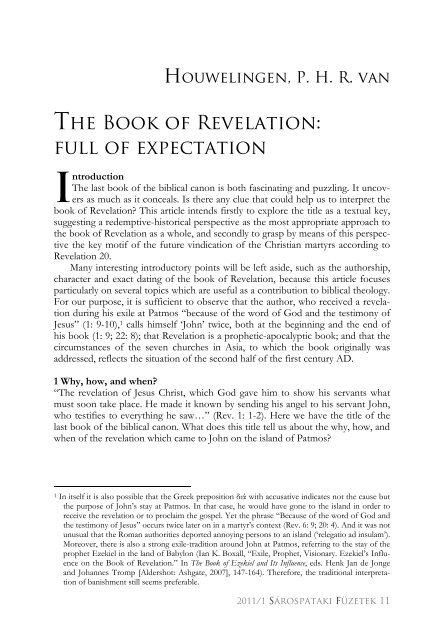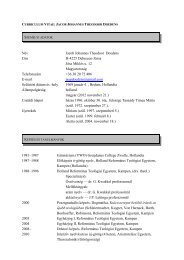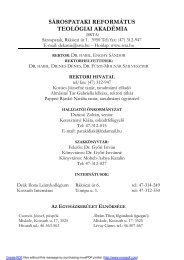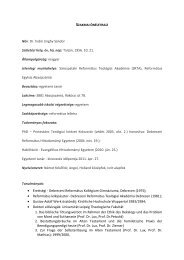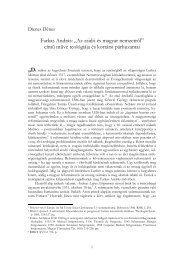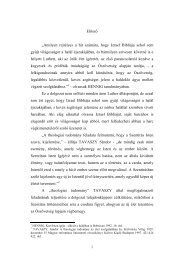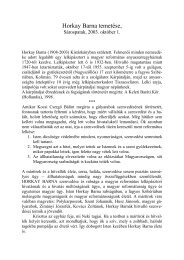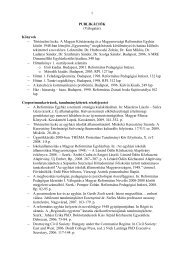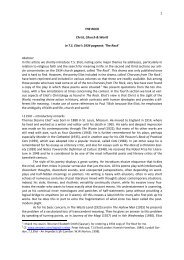2011/1 - Sárospataki Református Teológiai Akadémia
2011/1 - Sárospataki Református Teológiai Akadémia
2011/1 - Sárospataki Református Teológiai Akadémia
- No tags were found...
Create successful ePaper yourself
Turn your PDF publications into a flip-book with our unique Google optimized e-Paper software.
Houwelingen, P. H. R. van<br />
The Book of Revelation:<br />
full of expectation<br />
I<br />
ntroduction<br />
The last book of the biblical canon is both fascinating and puzzling. It uncovers<br />
as much as it conceals. Is there any clue that could help us to interpret the<br />
book of Revelation This article intends firstly to explore the title as a textual key,<br />
suggesting a redemptive-historical perspective as the most appropriate approach to<br />
the book of Revelation as a whole, and secondly to grasp by means of this perspective<br />
the key motif of the future vindication of the Christian martyrs according to<br />
Revelation 20.<br />
Many interesting introductory points will be left aside, such as the authorship,<br />
character and exact dating of the book of Revelation, because this article focuses<br />
particularly on several topics which are useful as a contribution to biblical theology.<br />
For our purpose, it is sufficient to observe that the author, who received a revelation<br />
during his exile at Patmos “because of the word of God and the testimony of<br />
Jesus” (1: 9-10), 1 calls himself ‘John’ twice, both at the beginning and the end of<br />
his book (1: 9; 22: 8); that Revelation is a prophetic-apocalyptic book; and that the<br />
circumstances of the seven churches in Asia, to which the book originally was<br />
addressed, reflects the situation of the second half of the first century AD.<br />
1 Why, how, and when<br />
“The revelation of Jesus Christ, which God gave him to show his servants what<br />
must soon take place. He made it known by sending his angel to his servant John,<br />
who testifies to everything he saw…” (Rev. 1: 1-2). Here we have the title of the<br />
last book of the biblical canon. What does this title tell us about the why, how, and<br />
when of the revelation which came to John on the island of Patmos<br />
1 In itself it is also possible that the Greek preposition διά with accusative indicates not the cause but<br />
the purpose of John’s stay at Patmos. In that case, he would have gone to the island in order to<br />
receive the revelation or to proclaim the gospel. Yet the phrase “Because of the word of God and<br />
the testimony of Jesus” occurs twice later on in a martyr’s context (Rev. 6: 9; 20: 4). And it was not<br />
unusual that the Roman authorities deported annoying persons to an island (‘relegatio ad insulam’).<br />
Moreover, there is also a strong exile-tradition around John at Patmos, referring to the stay of the<br />
prophet Ezekiel in the land of Babylon (Ian K. Boxall, “Exile, Prophet, Visionary. Ezekiel’s Influence<br />
on the Book of Revelation.” In The Book of Ezekiel and Its Influence, eds. Henk Jan de Jonge<br />
and Johannes Tromp [Aldershot: Ashgate, 2007], 147-164). Therefore, the traditional interpretation<br />
of banishment still seems preferable.<br />
<strong>2011</strong>/1 Sárospataki Füzetek 11


